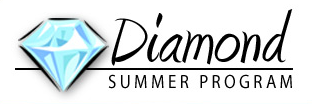
The Diamond Summer Program was founded in 1997 in Far Rockaway, NY. The program was established with a mission to improve the treatment of Attention Deficit Hyperactivity Disorder (ADHD), Oppositional Defiant Disorder (ODD), and other childhood behavioral disorders by:
Utilizing research based interventions in a natural setting
Training parents to improve the child/parent relationship in the home environment
Prepare children for behavioral success in school environments
The program, which is based on a landmark study funded by the NIMH, is specifically designed to improve children’s social behavior; friendship skills; academic competence; problem-solving skills; self-esteem; classroom behavior; sports competence; rule following; home behavior; and anger control.
The program has served well over 300 children the past 12 years. In past summers, children and their families came to us from Long Island, Queens, Flatbush, Crown Heights, Sunset Park, Riverdale, NYC, Detroit, Los Angeles, Monsey, Lakewood, Passaic, and Miami.
The Diamond Summer Program is currently the only one of two evidence-based summer programs in the New York metropolitan area to treat children with ADHD and related disorders. The Diamond Summer Program includes academic and recreational programming, with behavior modification procedures used in a natural environment to consistently reinforce appropriate social skills throughout the course of the day in all settings.
The Diamond Summer Program is a reward-based program which emphasizes individual achievement and success. It includes a variety of set activities that facilitate peer/group participation through which behavioral principles are applied. While the children are engaged in various activities (team sport, arts and crafts, swimming, etc.), their behavior is shaped through a point system. Children earn points for appropriate pro-social behavior and lose points for maladaptive behavior.
In addition to the point system, the program works on individual social skill development by:
After an appropriate baseline is established for the individual child, progress is systematically monitored and recorded through performance within the point system, individual goals, daily clinical staff meetings and tracked continuously throughout the day and throughout the summer. Progress is rewarded in both the camp and home settings. Weekly field trips are used as the major incentive for children who improve 20% from week too week. Field trips are “off-site” so that the skills learned in the program can be practiced in more natural settings.
Moreover, in the SPK, there is predictability and immediate feedback; the daily schedule does not change, and individual goals are established and reviewed with the children daily, so children know how they are progressing towards rewards. Not only is there consistency within the camp environment, but the consistency extends into the home environment via weekly parent training sessions and a home behavior plan that mimics the individualized behavior plans set up for each child at camp.
Diamond in the Rough
Flushing, NY
YS is an eleven year old boy who was typically referred to as the class clown. He had trouble focusing on class lessons and was consistently sent out of class for misbehavior. He also had trouble getting along with his peers who were legitimately frustrated with him. He was well liked by the principal but even that relationship was tiring after all the trouble Y had caused and by his constant crossing of boundaries.
Over the summer, Y worked on developing self awareness, impulse control and how to develop healthy relationships with campers and authority figures. He went back to school the next year and became one of the top students in his grade. He won a well known academic competition and is currently excelling socially and academically in a mainstream school.
Returning Children to Mainstream Schools
Los Angeles, CA
M and his family came to the Diamond Program cross-country from Los Angeles to work on M’s aggressive and inattentive behavior. M was originally placed in a mainstream school in Los Angeles but had to leave in first grade due to his poor social behavior. Two months after the summer program we received a phone call from M’s mother reporting that the people in the community keep commenting that M is a different child. After telling the community members about the summer program, the community members decided to invite the Diamond Summer Program to run a 10-day behavioral intervention program in Los Angeles during the Midwinter vacation of 2005.
The program in California consisted of students who were unable to function in mainstream schools. The principals of the local schools visited the program and decided to adopt a similar behavioral system and implement it in their mainstream schools. This facilitated the return of these students to a mainstream school and eventually enabled them to return to the mainstream classes they had come from.
Striving for Truth
Asher
One of the major benefits of the program is that the data collected during the day can be used diagnostically. Realized underlying problem was not ADHD but anxiety. Traumatic early experience of parent undergoing brain surgery. After changing pharmaceutical and behavioral treatment child.
Each bunk has a 2:1 camper to counselor ratio. The counselors consist of individuals who are in a masters or college level program. They are usually pursuing a career in the field of psychology, and receive an extensive one week training before camp begins. The counselors also attend continued training throughout the summer in which we focus on the accuracy of the delivery of the point system and to focus on individual goals for each child. Each child is analyzed from a clinical perspective and the counselors develop an approach to analyzing and treating the children. The program looks for counselors who are responsible, caring, patient, and passionate to help children.
Feel free to contact us with any questions or feedback.
Your message has already arrived! We’ll contact you shortly.